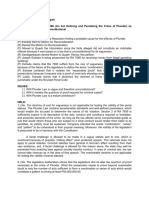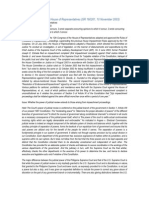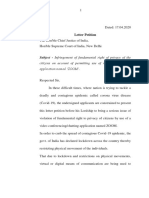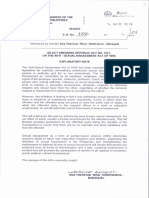Garcia Vs Drilon Digest
Garcia Vs Drilon Digest
Uploaded by
Brod LenamingCopyright:
Available Formats
Garcia Vs Drilon Digest
Garcia Vs Drilon Digest
Uploaded by
Brod LenamingOriginal Description:
Original Title
Copyright
Available Formats
Share this document
Did you find this document useful?
Is this content inappropriate?
Copyright:
Available Formats
Garcia Vs Drilon Digest
Garcia Vs Drilon Digest
Uploaded by
Brod LenamingCopyright:
Available Formats
G AR C I A V S D R I L O N ( 2 0 1 3 )
JESUS C. GARCIA vs. THE HONORABLE RAY ALAN T. DRILON, Presiding Judge, RTC, Bacolod City, and
ROSALIE JAYPE-GARCIA, et.al.
[G.R. No. 179267; June 25, 2013] Constitutional Law| Equal Protection Clause
Background of the case:
In 2004, Congress enacted RA No. 9262, entitled “An Act Defining Violence Against Women and Their
Children”. It defines and criminalizes acts of violence against women and their children (VAWC) perpetrated by
women’s intimate partners, i.e, husband; former husband; or any person who has or had a sexual or dating
relationship, or with whom the woman has a common child.
FACTS:
Rosalie Jaype-Garcia filed, for herself and in behalf of her minor children for a Temporary Protection Order
against her husband, Jesus C. Garcia pursuant to R.A. 9262. She claimed to be a victim of physical abuse;
emotional, psychological, and economic violence as a result of marital infidelity on the part of petitioner, with
threats of deprivation of custody of her children and of financial support. The husband now, assails the
constitutionality of RA 9262 as being violative of the equal protection clause.
ISSUE: Whether there is a violation of equal protection clause.
HELD: R.A. 9262 does not violate the guaranty of equal protection of the laws.
Equal protection simply requires that all persons or things similarly situated should be treated alike, both as to
rights conferred and responsibilities imposed. R.A. 9262 is based on a valid classification as shall hereinafter
be discussed and, as such, did not violate the equal protection clause by favoring women over men as victims
of violence and abuse to whom the State extends its protection.
There is likewise no merit to the contention that R.A. 9262 singles out the husband or father as the culprit. As
defined above, VAWC may likewise be committed “against a woman with whom the person has or had a
sexual or dating relationship.” Clearly, the use of the gender-neutral word “person” who has or had a sexual or
dating relationship with the woman encompasses even lesbian relationships.
R.A. 9262 is based on a valid classification as such, did not violate the equal protection clause by favoring
women over men as victims of violence and abuse to whom the State extends its protection. The unequal
power relationship between women and men; the fact that women are more likely than men to be victims of
violence; and the widespread gender bias and prejudice against women all make for real differences justifying
the classification under the law. As Justice McIntyre succinctly states, “the accommodation of differences … is
the essence of true equality.”
GARCIA v. DRILON G.R. No. 179267 June 25, 2013 699 SCRA 352
FACTS: Petitioner Jesus Garcia (husband) admitted having an affair with a bank manager. His infidelity
emotionally wounded private respondent which spawned several quarrels that left respondent wounded.
Petitioner also unconscionably beat up their daughter, Jo-ann.
The private respondent was determined to separate from petitioner. But she was afraid he would take away
their children and deprive her of financial support. He warned her that if she pursued legal battle, she would not
get a single centavo from him. After she confronted him of his affair, he forbade her to hold office. This
deprived her of access to full information about their businesses. Hence, no source of income.
Thus, the RTC found reasonable ground to believe there was imminent danger of violence against respondent
and her children and issued a series of Temporary Protection Orders (TPO) pursuant to RA 9262.
Republic Act No. 9262 is a landmark legislation that defines and criminalizes acts of violence against women
and their children (VAWC) perpetrated by women's intimate partners.
Petitioner hence, challenged the constitutionality of RA 9262 on making a gender-based classification.
ISSUE: Whether or not RA 9262 is discriminatory, unjust, and violative of the equal protection clause.
RULING: No. The equal protection clause in our Constitution does not guarantee an absolute prohibition
against classification. The non-identical treatment of women and men under RA 9262 is justified to put them on
equal footing and to give substance to the policy and aim of the state to ensure the equality of women and men
in light of the biological, historical, social, and culturally endowed differences between men and women.
RA 9262, by affording special and exclusive protection to women and children, who are vulnerable victims of
domestic violence, undoubtedly serves the important governmental objectives of protecting human rights,
insuring gender equality, and empowering women. The gender-based classification and the special remedies
prescribed by said law in favor of women and children are substantially related, in fact essentially necessary, to
achieve such objectives. Hence, said Act survives the intermediate review or middle-tier judicial scrutiny. The
gender-based classification therein is therefore not violative of the equal protection clause embodied in the
1987 Constitution.
You might also like
- Laurel Vs MisaDocument5 pagesLaurel Vs MisaAj Guadalupe de MataNo ratings yet
- Garcia v. Drilon Case DigestDocument2 pagesGarcia v. Drilon Case DigestCesca Balasbas100% (13)
- 11 Garcia V DrilonDocument4 pages11 Garcia V DrilonCedric Enriquez100% (1)
- Garcia Vs Drilon (Petitioner and SC)Document3 pagesGarcia Vs Drilon (Petitioner and SC)Lanz Olives83% (6)
- Jesus Garcia vs. The Honorable Ray Alan Drilon FactsDocument3 pagesJesus Garcia vs. The Honorable Ray Alan Drilon FactsCharlenePlazaNo ratings yet
- Garcia V Drilon Case DigestDocument11 pagesGarcia V Drilon Case DigestNino Karlo Palacio Agner100% (3)
- Garcia Vs Drilon SummaryDocument7 pagesGarcia Vs Drilon SummaryJohnday MartirezNo ratings yet
- Imbong Vs Ochoa (Case Digest)Document7 pagesImbong Vs Ochoa (Case Digest)FeBrluado83% (6)
- Garcia Vs DrilonDocument2 pagesGarcia Vs DrilonAndrea Rio100% (1)
- Marcos Vs Manglapus Case DigestDocument6 pagesMarcos Vs Manglapus Case Digestzanjknight100% (1)
- Borjal Vs CA DigestDocument4 pagesBorjal Vs CA DigestJohn Daryl B. Yu100% (1)
- Imbong Vs Ochoa DigestDocument7 pagesImbong Vs Ochoa Digestleslansangan100% (2)
- Imbong V Ochoa (GR No 204819) DigestDocument4 pagesImbong V Ochoa (GR No 204819) DigestJose Ramon Ampil83% (6)
- Cabanas Vs PilapilDocument2 pagesCabanas Vs PilapilJacinth DelosSantos DelaCerna0% (1)
- Case Digest in Francisco vs. House of RepresentativesDocument2 pagesCase Digest in Francisco vs. House of RepresentativesJP DC100% (2)
- Estrada Vs SandiganbayanDocument2 pagesEstrada Vs SandiganbayanDianne Camille UyNo ratings yet
- Estrada Vs Escritor Case DigestDocument4 pagesEstrada Vs Escritor Case DigestPatrick D Gueta100% (3)
- Estrada Vs Escritor Summary and DiscussionDocument6 pagesEstrada Vs Escritor Summary and DiscussionMis Dee100% (4)
- Garcia vs. Drilon Case DigestDocument2 pagesGarcia vs. Drilon Case DigestGilbert John LacorteNo ratings yet
- Imbong v. Ochoa - Case Digest: FactsDocument6 pagesImbong v. Ochoa - Case Digest: FactsRuth Angelica Teoxon100% (3)
- Francisco vs. HOR DigestDocument3 pagesFrancisco vs. HOR DigestMark Abilo100% (3)
- Villavicencio vs. LukbanDocument1 pageVillavicencio vs. LukbanThea Pabillore100% (10)
- Republic V SandovalDocument3 pagesRepublic V SandovalFranzArzadonNo ratings yet
- Guido Vs Rural Progress AdministrationDocument2 pagesGuido Vs Rural Progress AdministrationsejinmaNo ratings yet
- Chi Ming Tsoi vs. CADocument3 pagesChi Ming Tsoi vs. CAneo paul100% (1)
- Estrada Vs Escritor Case Digest - NavarroDocument1 pageEstrada Vs Escritor Case Digest - NavarroCoco Navarro100% (1)
- G.R. No. 189158 - Ient Vs Tullet PrebonDocument20 pagesG.R. No. 189158 - Ient Vs Tullet PrebonMark100% (1)
- Biraogo Vs The Philippine Truth Commission Case DigestDocument3 pagesBiraogo Vs The Philippine Truth Commission Case DigestRowell Ian Gana-an100% (5)
- G.R. No. L-9726 US V.S. TaylorDocument5 pagesG.R. No. L-9726 US V.S. TaylorNaezel BaronNo ratings yet
- Estrada v. Escritor DigestDocument1 pageEstrada v. Escritor DigestChristy Tiu-Fua100% (4)
- Magallona vs. Ermita G.R No. 187167 August 16 2011Document2 pagesMagallona vs. Ermita G.R No. 187167 August 16 2011Lex Acads100% (4)
- Blas F. Ople Vs Ruben D. Torres, Et Al.Document2 pagesBlas F. Ople Vs Ruben D. Torres, Et Al.Sheila Bollozos100% (3)
- Case Digest (Consti 1) 1 v2Document118 pagesCase Digest (Consti 1) 1 v2GARCIA, Axl100% (1)
- Get Homework/Assignment DoneDocument7 pagesGet Homework/Assignment DoneDean CainilaNo ratings yet
- Del Rosario vs. BengzonDocument2 pagesDel Rosario vs. BengzonJoseMarellaNo ratings yet
- Imbong Vs Ochoa Case DigestDocument10 pagesImbong Vs Ochoa Case DigestAlexylle Garsula de ConcepcionNo ratings yet
- Imbong Vs Ochoa (Case Digest)Document14 pagesImbong Vs Ochoa (Case Digest)Jillian Gatchalian Paris86% (14)
- Del Socorro vs. Van WilsemDocument3 pagesDel Socorro vs. Van WilsemMikkoy1880% (5)
- (A38) LAW 121 - Ople vs. Torres (G.R. No. 127685)Document4 pages(A38) LAW 121 - Ople vs. Torres (G.R. No. 127685)m100% (5)
- GR Nos. 146710-15Document2 pagesGR Nos. 146710-15Juvial Guevarra BostonNo ratings yet
- People vs. Pomar Case DigestDocument1 pagePeople vs. Pomar Case Digestfafa_mhedz67% (3)
- AAA Vs BBB GR No. 212448Document1 pageAAA Vs BBB GR No. 212448Mia AngelaNo ratings yet
- Defensor Santiago V VasquezDocument2 pagesDefensor Santiago V VasquezChino Sison100% (2)
- People Vs Marivic Genosa (Digest)Document7 pagesPeople Vs Marivic Genosa (Digest)AspirinLaw100% (4)
- Southern Hemisphere Engagement Network IncDocument2 pagesSouthern Hemisphere Engagement Network IncJessica Joyce Penalosa100% (1)
- Leouel Santos Vs CADocument3 pagesLeouel Santos Vs CAM GNo ratings yet
- Marcos Vs Manglapus DigestDocument4 pagesMarcos Vs Manglapus Digestjelynept100% (2)
- Aglipay vs. Ruiz DigestDocument1 pageAglipay vs. Ruiz DigestRad Isnani100% (1)
- Persons Digests CompiledV1Document27 pagesPersons Digests CompiledV1phoebelaz100% (2)
- Ang Ladlad LGBT Party v. ComelecDocument3 pagesAng Ladlad LGBT Party v. ComelecArellano Law SC100% (2)
- UP v. DizonDocument0 pagesUP v. DizonRonwell Lim100% (2)
- People Vs PomarDocument2 pagesPeople Vs PomarRean Raphaelle GonzalesNo ratings yet
- 57 People V DeriloDocument2 pages57 People V DeriloMalcolm Cruz100% (1)
- Disini Vs Secretary of Justice DigestDocument1 pageDisini Vs Secretary of Justice DigestJA QuibzNo ratings yet
- Reagan V CIRDocument2 pagesReagan V CIRJR PinedaNo ratings yet
- Gonzales vs. Narvasa, GR 140835, Aug14'00 - DigestDocument1 pageGonzales vs. Narvasa, GR 140835, Aug14'00 - DigestKyle GwapoNo ratings yet
- Rhonda Ave S. Vivares and Sps. Margarita and David Suzara vs. St. Theresa'S College, Mylene Rhea Escudero and John DoesDocument2 pagesRhonda Ave S. Vivares and Sps. Margarita and David Suzara vs. St. Theresa'S College, Mylene Rhea Escudero and John DoesJay CezarNo ratings yet
- Garcia V The Hon. Ray Alan J. Drilon Et Al. GR No. 179267 June 25, 2013Document1 pageGarcia V The Hon. Ray Alan J. Drilon Et Al. GR No. 179267 June 25, 2013Raiza SunggayNo ratings yet
- Garcia V RomanDocument2 pagesGarcia V RomanzykeNo ratings yet
- Acitivity and QuizDocument4 pagesAcitivity and QuizShere Mae RamirezNo ratings yet
- Black ChandelierDocument1 pageBlack ChandelierBrod LenamingNo ratings yet
- Ever LongDocument1 pageEver LongBrod LenamingNo ratings yet
- Lagman Et. Al. V. Medialdea Et. Al., G.R. Nos. 231568/231771/231774, July 4, 2017Document2 pagesLagman Et. Al. V. Medialdea Et. Al., G.R. Nos. 231568/231771/231774, July 4, 2017Brod LenamingNo ratings yet
- Pier 8 vs. ConfesorDocument7 pagesPier 8 vs. ConfesorBrod LenamingNo ratings yet
- RPECDocument11 pagesRPECBrod LenamingNo ratings yet
- People vs. Webb: Choice of Remedy: Sun, Jan 23, 2011Document3 pagesPeople vs. Webb: Choice of Remedy: Sun, Jan 23, 2011Brod LenamingNo ratings yet
- People V JohnsonDocument1 pagePeople V JohnsonBrod LenamingNo ratings yet
- Notes On DotDocument27 pagesNotes On DotBrod LenamingNo ratings yet
- Ra 7160 Sec.444 B-1.18Document7 pagesRa 7160 Sec.444 B-1.18Brod LenamingNo ratings yet
- Forform Vs PNRDocument1 pageForform Vs PNRBrod LenamingNo ratings yet
- Rivera v. AngelesDocument2 pagesRivera v. AngelesBrod LenamingNo ratings yet
- People Vs ValdezDocument2 pagesPeople Vs ValdezBrod LenamingNo ratings yet
- MAGGIE DELA RIVA CaseDocument16 pagesMAGGIE DELA RIVA CaseBrod LenamingNo ratings yet
- Jose Diokno Principle in PoliticsDocument2 pagesJose Diokno Principle in PoliticsBrod LenamingNo ratings yet
- Duran & Lim For Respondent. Attorney-General Jaranilla and Provincial Fiscal Jose For The GovernmentDocument2 pagesDuran & Lim For Respondent. Attorney-General Jaranilla and Provincial Fiscal Jose For The GovernmentBrod LenamingNo ratings yet
- Aadhaar Act 2016 Upsc Notes 82Document3 pagesAadhaar Act 2016 Upsc Notes 82Avik PodderNo ratings yet
- Team Up Plus Dla Klasy V Ksiazka NauczycielaDocument80 pagesTeam Up Plus Dla Klasy V Ksiazka NauczycielaanaNo ratings yet
- Human Resource Management: Equal Opportunity and The LawDocument62 pagesHuman Resource Management: Equal Opportunity and The LawPhan Ngọc ÁnhNo ratings yet
- Detroit Lakes Police Department Preliminary Body Camera Policy, Feb. 8, 2022Document7 pagesDetroit Lakes Police Department Preliminary Body Camera Policy, Feb. 8, 2022Michael AchterlingNo ratings yet
- National History Day Process PaperDocument4 pagesNational History Day Process Paperrheta_607013No ratings yet
- New Microsoft Excel WorksheetDocument105 pagesNew Microsoft Excel WorksheetAshish MeshramNo ratings yet
- Learning The Arabic AlphabetDocument30 pagesLearning The Arabic AlphabetMountainofknowledgeNo ratings yet
- Civil and Political Rights As Applied in The PhilippinesDocument6 pagesCivil and Political Rights As Applied in The PhilippinesTan Jip-on91% (11)
- Practical - Guide - To - Diagnosing - Structural - Movement - in - Buildings (2) Hasta 114Document59 pagesPractical - Guide - To - Diagnosing - Structural - Movement - in - Buildings (2) Hasta 114miguel silvaNo ratings yet
- First Amendment AssignmentDocument2 pagesFirst Amendment Assignmentapi-260853885No ratings yet
- Discursive Writing On ProtestingDocument2 pagesDiscursive Writing On ProtestingUnbound RacerNo ratings yet
- Paper 3D - Low PolyDocument14 pagesPaper 3D - Low PolyEren akarsuNo ratings yet
- Sovereignty and Integrity of IndiaDocument8 pagesSovereignty and Integrity of IndiaFini GraceNo ratings yet
- Position PaperDocument4 pagesPosition Paperkimwell palisNo ratings yet
- Format of Letter Petition in Supreme Court of IndiaDocument4 pagesFormat of Letter Petition in Supreme Court of IndiaMANOHAR PRATAPNo ratings yet
- Literature ReviewDocument3 pagesLiterature Reviewapi-509122536No ratings yet
- Freedom of MediaDocument5 pagesFreedom of MediaAbhishekNo ratings yet
- A Gift of Fire: Freedom of Speech in CyberspaceDocument21 pagesA Gift of Fire: Freedom of Speech in CyberspaceIrul SakuragiNo ratings yet
- AMITY UNIVERSITY, Uttar Pradesh Lucknow Campus Intership Program and Confidentiality AgreementDocument3 pagesAMITY UNIVERSITY, Uttar Pradesh Lucknow Campus Intership Program and Confidentiality AgreementHaleen kaurNo ratings yet
- Your Body Your ChoiceDocument10 pagesYour Body Your Choiceapi-519452875No ratings yet
- Posicionamiento - Resumen Del Libro de Al Ries y Jack Trout PDFDocument32 pagesPosicionamiento - Resumen Del Libro de Al Ries y Jack Trout PDFyeseniaNo ratings yet
- CLX-9251NA SEE PartsDocument51 pagesCLX-9251NA SEE PartsANINo ratings yet
- Perceptions On SOGIE BillDocument2 pagesPerceptions On SOGIE BillGilbert Picasales100% (3)
- Asme B.18.2.2Document42 pagesAsme B.18.2.2Susan Sue Berrospi MerinoNo ratings yet
- Ism04 PDFDocument99 pagesIsm04 PDFMA KhanNo ratings yet
- Anti-Sexual Harassment Act of 2016Document3 pagesAnti-Sexual Harassment Act of 2016Dawn BernabeNo ratings yet
- Consti 2 SBU Mod 7 (2023 Sec. 4 Speech)Document3 pagesConsti 2 SBU Mod 7 (2023 Sec. 4 Speech)Jayson VicedoNo ratings yet
- Trans ResourcesDocument4 pagesTrans Resourcesapi-447698563No ratings yet
- SootaoasDocument1 pageSootaoasP v v RaoNo ratings yet
- Bellissima Donna An InterdiscDocument530 pagesBellissima Donna An InterdiscbrookrigiNo ratings yet








































































































